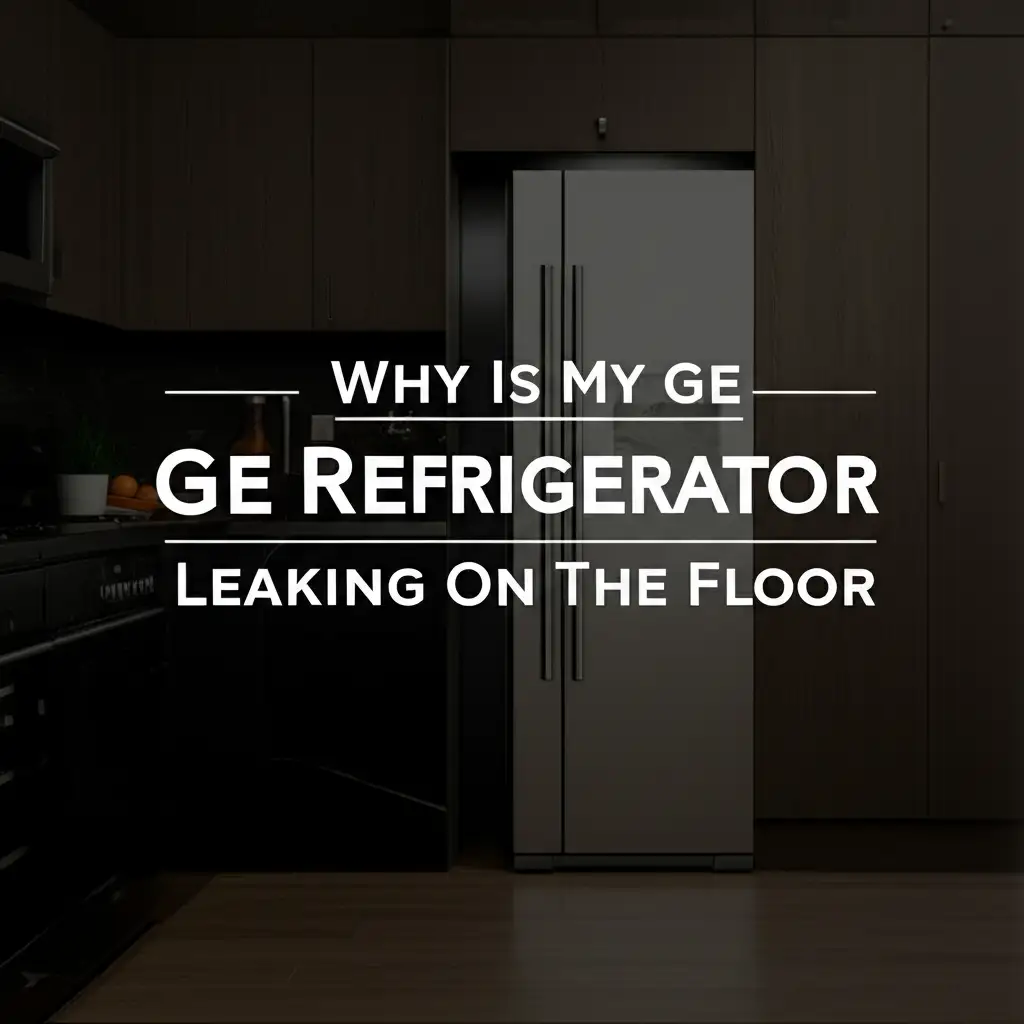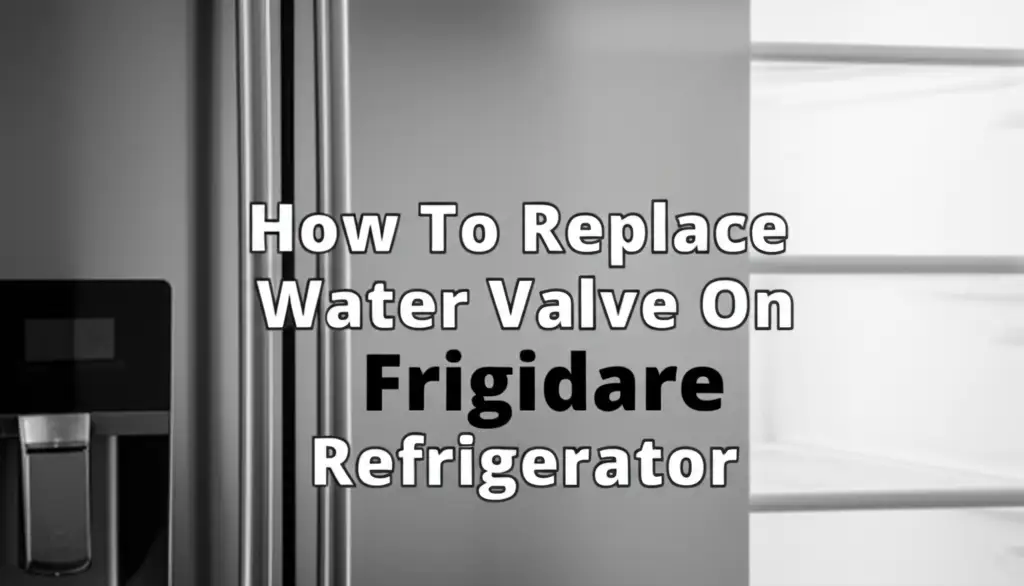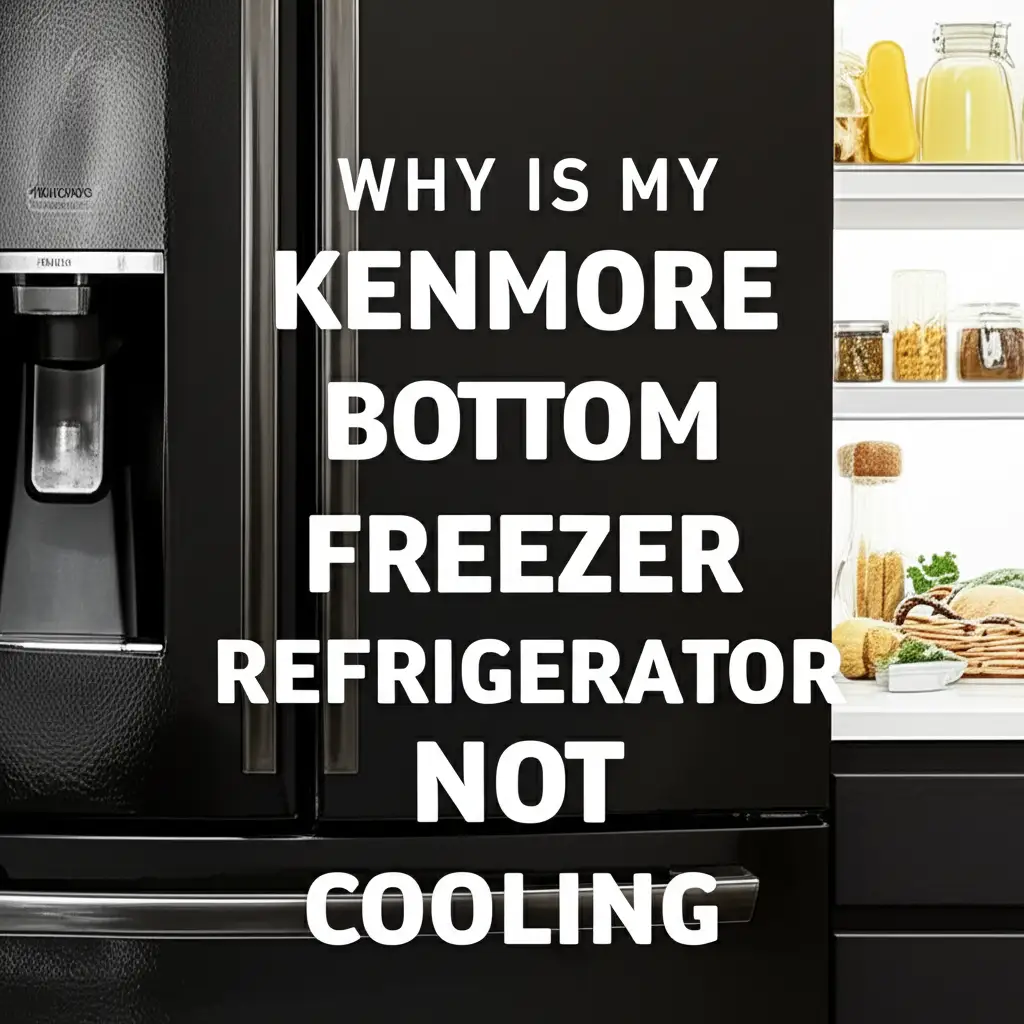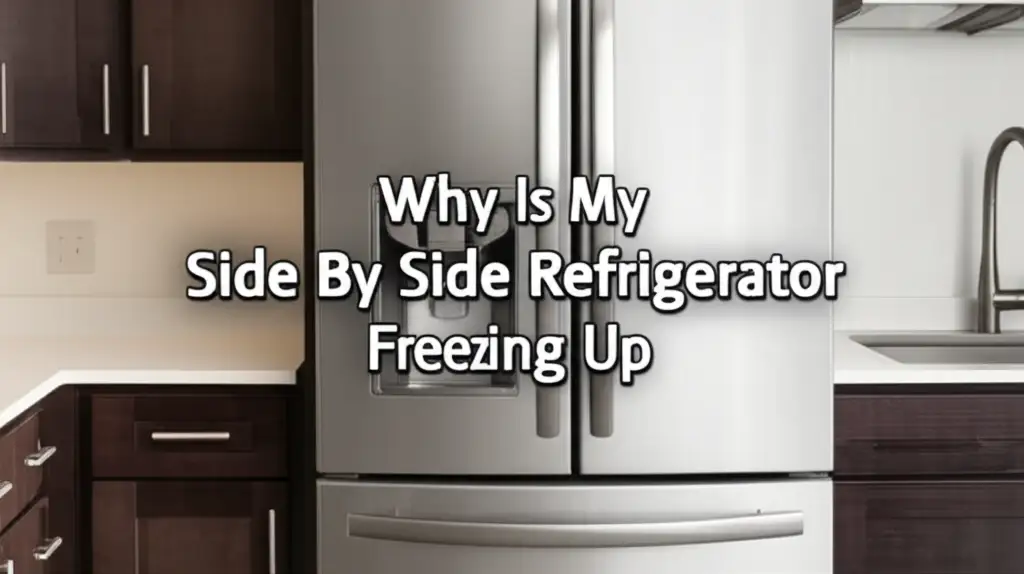· Katria Melrose · Refrigerator Repair · 21 min read
Why Is My Bosch Refrigerator Leaking Water From The Dispenser
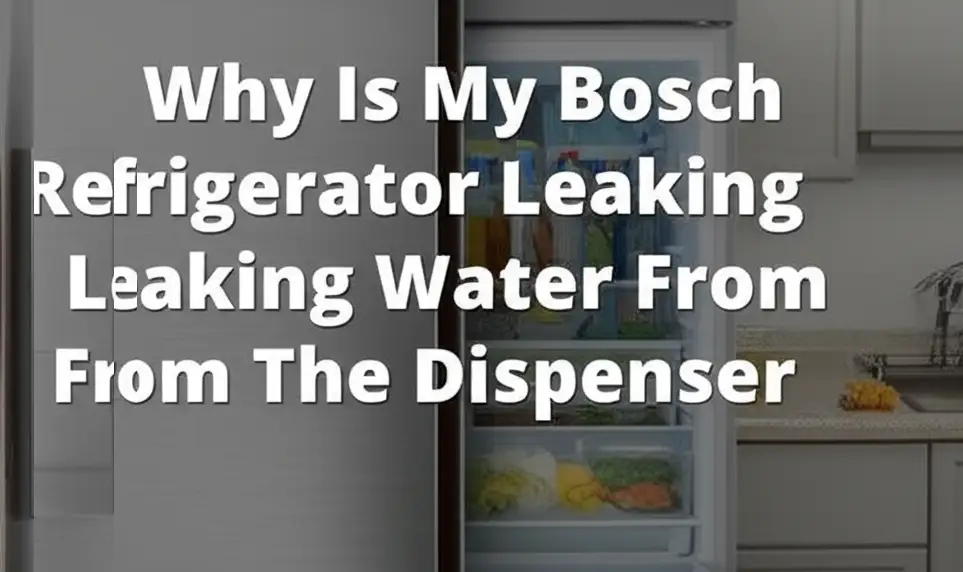
Fixing Your Bosch Refrigerator Leaking Water From The Dispenser
Discovering a puddle of water around your refrigerator’s base can quickly ruin your day. Even more frustrating is when you notice your Bosch refrigerator leaking water from the dispenser.
This issue is not only annoying but also signals a problem that needs your attention. A persistent leak can damage your flooring, create slippery hazards, and potentially lead to mold growth.
Fortunately, many common causes behind a leaking Bosch water dispenser are simple to diagnose and fix yourself. You do not always need a technician. I am here to help you understand why your Bosch refrigerator is leaking water from its dispenser and how to tackle these issues.
We will walk through everything from straightforward water line checks to more involved component inspections. Let us get your Bosch refrigerator working perfectly again.
Takeaway
- Check the water supply line for any kinks, damage, or loose connections.
- Inspect your water filter for incorrect installation or clogs.
- Verify the water inlet valve for proper function and signs of leakage.
- Clear any ice or debris blockages within the dispenser chute.
- Ensure the dispenser drip tray is not overflowing or damaged.
- Consider professional assistance if the issue persists after your checks.
Why does my Bosch refrigerator leak water from its dispenser?
A Bosch refrigerator often leaks water from the dispenser due to a loose or cracked water supply line, an incorrectly installed or faulty water filter, a malfunctioning water inlet valve, or a clogged dispenser drip tray/chute. Regular inspection and simple fixes can resolve most issues.
Diagnosing Water Leaks: Your Bosch Refrigerator’s Water Supply Line
One of the most frequent culprits behind a Bosch refrigerator leaking water from the dispenser is an issue with the water supply line. This line connects your refrigerator to your home’s water source. Any problem with it can send water where it does not belong. I always start my investigation here because it is often the easiest to spot and fix.
The water supply line can develop several problems. It might be loose at the connection points, or the tubing itself could be cracked or punctured. Over time, even small vibrations from the refrigerator can loosen fittings. Accidental bumps or improper installation can also damage the line. Ensuring this line is in good condition and properly connected is a crucial first step in troubleshooting any leak from your Bosch appliance.
Inspecting Connections and Tubing
First, you need to access the back of your refrigerator. Carefully pull the appliance away from the wall to reveal the rear components. Look for the thin water line, usually made of copper or braided stainless steel, that runs from your wall’s water shut-off valve to the refrigerator’s water inlet valve. I always check the connections first. Feel around each connection point for any moisture. You might see visible water drops or mineral deposits if there is a slow leak. Tighten any loose fittings with a wrench, but do not overtighten, as this can strip the threads or crack plastic components.
Next, carefully inspect the entire length of the water line. Look for any visible cracks, crimps, or punctures in the tubing. Sometimes, small holes can develop, especially if the line has been rubbing against something or was bent sharply during installation. Even a tiny pinhole can lead to a significant leak over time. If you find any damage, the water line will need replacement. Replacing a water supply line is a relatively simple task that many homeowners can do themselves, but it requires shutting off the water supply to your home. You can learn more about general refrigerator leaks that affect various brands, like Kenmore, by visiting our article on why your Kenmore refrigerator might be leaking water from the water dispenser.
Checking for Kinks and Damage
Beyond obvious cracks, a water line can also cause leaks if it is kinked. A severe kink restricts water flow, leading to pressure build-up in the line. This increased pressure can stress connections and other components, causing them to leak. When you pull your refrigerator out, check behind it to ensure the water line is not sharply bent or crimped by the appliance itself or by other objects. Sometimes, simply repositioning the refrigerator or securing the line can resolve the issue.
Also, examine the tubing material. Older plastic lines are more prone to brittleness and cracking over time. Braided stainless steel lines offer more durability and are less likely to kink or crack. If your line is old or made of plastic, consider upgrading to a braided stainless steel one. This upgrade can prevent future leaks and give you peace of mind. A sound water supply line is the foundation of a leak-free water dispenser system.
The Water Filter Connection: A Common Bosch Refrigerator Leak Source
Another primary reason your Bosch refrigerator might be leaking water from the dispenser often involves the water filter. The water filter is a crucial component that cleans your drinking water. However, if it is not installed correctly or becomes clogged, it can become a significant source of leaks. I have seen many cases where a seemingly complex leak issue was simply due to a misplaced or faulty filter.
Bosch refrigerators use specific filter types, and inserting them incorrectly can create a pathway for water to escape. Over time, filters also collect sediment and debris, which can increase water pressure within the system. This increased pressure puts stress on the filter housing and seals, potentially leading to drips and leaks around the dispenser area. Checking your water filter is a vital step in troubleshooting any dispenser leak.
Incorrect Filter Installation
When you replace your Bosch refrigerator’s water filter, it is essential to follow the manufacturer’s instructions precisely. Even a slight misalignment can prevent the filter from sealing correctly. If the filter is not seated all the way or is twisted incorrectly, water can bypass the seal and leak out. This often manifests as drips from or near the filter housing, which can then run down and appear to come from the dispenser area.
I always recommend carefully removing the old filter and comparing it to the new one to ensure they are identical. Then, insert the new filter firmly, making sure it clicks into place if your model has a locking mechanism. After installation, run a few gallons of water through the dispenser to purge air and check for immediate leaks around the filter housing. A loose filter is a very common cause of water leaks. For a deeper dive into this specific problem, you can read about why your Samsung refrigerator might be leaking water from the filter or explore issues with Frigidaire refrigerator leaks from the filter. These articles provide broader insights into filter-related leaks, which are highly relevant to Bosch models as well.
Clogged or Faulty Water Filter
Even if installed correctly, an old or clogged water filter can cause leaks. As a filter traps impurities, its internal components can become saturated. This saturation increases the resistance to water flow, leading to higher water pressure within the refrigerator’s water lines and filter housing. This elevated pressure can eventually force water past seals or weak points, resulting in a leak. You might notice slower water dispensing or changes in water taste as signs of a clogged filter.
Sometimes, the filter itself can be faulty. Internal defects or cracks in the filter casing, though rare, can also lead to leaks. If you suspect your filter is old or damaged, replacing it is the best course of action. Bosch recommends replacing filters every six months, or sooner if you have hard water or high water usage. Always use genuine Bosch replacement filters or certified compatible alternatives to ensure proper fit and function. A fresh, properly installed filter often solves dispenser leak problems quickly.
Water Inlet Valve Issues Affecting Your Bosch Dispenser
When your Bosch refrigerator is leaking water from the dispenser, the water inlet valve is another critical component to investigate. This valve acts as a gatekeeper, controlling the flow of water from your home’s supply line into the refrigerator’s internal water system, including the ice maker and water dispenser. If this valve malfunctions, it can lead to frustrating leaks. I consider it a prime suspect when other more obvious causes have been ruled out.
The water inlet valve is an electrically operated component, usually located at the back of the refrigerator near the bottom. It opens when you request water from the dispenser or when the ice maker needs to refill. Over time, wear and tear, mineral deposits, or defects can cause the valve to stick open slightly, crack, or fail to seal completely. Any of these issues will allow water to drip continuously, eventually making its way to the dispenser area or even pooling beneath the appliance.
Signs of a Malfunctioning Inlet Valve
Several signs can indicate a problem with your Bosch refrigerator’s water inlet valve. The most obvious is a visible drip or stream of water coming from the valve itself. You might need to pull the refrigerator away from the wall to observe this. Look for water pooling directly beneath the valve or running down the back panel. Another sign is constant dripping from the water dispenser even when not in use. This suggests the valve is not completely closing.
You might also notice unusual noises, such as a continuous humming or buzzing sound, coming from the back of the refrigerator. This noise could indicate the valve is struggling to open or close properly. Sometimes, the issue is not a leak from the valve itself but low water pressure reaching the dispenser, which can cause the valve to partially open or lead to a drip. If water flow is weak, it could point to a valve problem, among other things. Always turn off the water supply to your refrigerator before inspecting the valve.
Testing and Replacing the Valve
Testing a water inlet valve typically involves checking its electrical continuity with a multimeter if you are comfortable with basic electrical tests. However, for most homeowners, a visual inspection for leaks and listening for abnormal sounds are good first steps. If you see water dripping directly from the valve, or if you have ruled out other common leak sources, replacing the water inlet valve is often the next logical step. This is a common repair for many refrigerator brands, not just Bosch.
Replacing the valve requires shutting off the water supply to your home, disconnecting the refrigerator from power, and carefully detaching the water lines and electrical connections from the old valve. Then, you simply install the new valve in reverse order. Make sure to use an exact replacement part recommended by Bosch for your specific model. While it is a more involved repair than replacing a filter, it is often a DIY task for those with some basic tool knowledge. If you are unsure, contacting a professional appliance technician is always a safe choice.
Clogs and Spills: Addressing the Dispenser Chute and Drip Tray
When your Bosch refrigerator is leaking water from the dispenser, sometimes the problem is less about a component failure and more about simple maintenance. The dispenser chute and drip tray are areas that frequently accumulate ice, debris, or just general water spills. These seemingly minor issues can lead to persistent and annoying leaks if left unaddressed. I have often found that these areas are overlooked during routine cleaning, which then leads to frustrating water problems.
The dispenser chute is where water and ice exit the refrigerator. If it becomes clogged with ice or food particles, water can back up and overflow. Similarly, the drip tray at the bottom of the dispenser is designed to catch small drips, but if it overflows or is cracked, water will escape onto your floor. Addressing these areas is usually quick and can save you from bigger headaches.
Clearing Ice and Debris Blockages
Ice buildup within the dispenser chute is a common culprit. When you dispense ice, small shards can remain in the chute. Over time, these small pieces can melt and refreeze, forming a solid block of ice that obstructs the path for water and new ice. This blockage causes water to back up inside the dispenser assembly and then leak out. Sometimes, food crumbs or other debris can also fall into the chute, mixing with melting ice to create a gooey blockage.
To clear a blockage, first, unplug your refrigerator for safety. Then, use a plastic or wooden utensil (never metal, to avoid damaging the components) to gently break up any visible ice or dislodge debris in the chute. You can also use a hairdryer on a low, cool setting to carefully melt ice buildup, but be very cautious not to overheat or damage plastic parts. Once cleared, ensure the path is free for water and ice to flow smoothly. Regular cleaning of this area can prevent future blockages.
Maintaining the Drip Tray and Dispenser Area
The dispenser drip tray is designed to catch small amounts of water that inevitably drip after dispensing. However, if this tray is full, cracked, or has accumulated significant mineral deposits, it can become a source of leaks. An overflowing drip tray will simply spill water onto your floor or down the refrigerator door. A cracked tray, even if small, will allow water to seep out continuously.
I recommend regularly cleaning your drip tray and the entire dispenser area. Remove the drip tray, empty any water, and wash it thoroughly with soap and water. Clean around the dispenser paddle and the ice chute with a damp cloth, wiping away any water spots or grime. Pay attention to any signs of mold or mildew, which can thrive in damp conditions. For comprehensive guidance on keeping your dispenser clean, consider reading our article on how to clean refrigerator water dispenser mold. Additionally, understanding how to clean a water dispenser on a fridge more generally can help prevent future issues. If your drip tray is cracked, it needs to be replaced. These small maintenance steps go a long way in preventing annoying leaks.
Frozen Components: When Ice Causes Your Bosch Dispenser to Leak
While many leaks are due to loose connections or faulty parts, sometimes your Bosch refrigerator is leaking water from the dispenser because of ice. A frozen water line or a frozen dispenser mechanism can cause significant problems. When water turns to ice, it expands. This expansion can put immense pressure on water lines and dispenser components, leading to cracks or blockages that result in leaks. I have found this to be a surprisingly common cause, especially in homes where the refrigerator might be in a cooler area or if there are issues with the fridge’s defrost system.
A frozen water line within the door or behind the dispenser assembly prevents water from flowing normally. When you try to dispense water, the incoming water has nowhere to go but back up, often finding a way to leak out. Similarly, if the dispenser’s internal parts freeze, they may not close properly, leading to continuous dripping. Understanding how to identify and address these frozen components is key to resolving such leaks.
Identifying Frozen Water Lines
The water line that supplies the dispenser runs through the freezer door or along the back of the refrigerator. If this line freezes, you will typically notice that your water dispenser stops working entirely, or it only produces a trickle of water. However, if the freeze is partial or occurs at a bend, it can create a backup of pressure. This pressure then forces water out through the weakest point, leading to a leak near the dispenser. You might see ice buildup around the dispenser nozzle itself.
To confirm a frozen line, you can try gently feeling the water line where it enters the door or goes behind the dispenser. If it feels rigid or unusually cold in a localized spot, it likely has ice inside. Another indicator is if the ice maker is working fine but the water dispenser is not. This often points to a frozen line specifically affecting the dispenser. Do not try to force water through it, as this can worsen the leak or damage the line further.
Thawing the Dispenser System
Thawing a frozen water line or dispenser mechanism safely requires patience. The simplest and most effective method is to unplug the refrigerator and leave the freezer and fresh food doors open for several hours, or even overnight. This allows the entire system to warm up and any ice to melt naturally. Placing towels on the floor around the refrigerator will help catch any melting water. You can also place a fan near the open doors to circulate air and speed up the thawing process.
For more targeted thawing, you can use a hairdryer on a low, cool setting. Direct the air at the dispenser area and the back of the refrigerator where the water line enters. Be extremely careful not to use high heat or direct the air at one spot for too long, as this can damage plastic components or insulation. Once thawed, plug the refrigerator back in and run a few cups of water through the dispenser to ensure the line is clear and water flows freely. If the problem reoccurs frequently, it might indicate an issue with your refrigerator’s defrost system or a draft getting into the dispenser area, which may require professional help.
Dispenser Actuator and Control Board Glitches
While less common than a faulty water line or filter, sometimes your Bosch refrigerator is leaking water from the dispenser due to an issue with the dispenser’s internal mechanics or electrical controls. The dispenser actuator, which is the paddle or button you press to get water, and the main control board work together to manage water flow. If either of these components malfunctions, it can cause the dispenser to drip or constantly run. I consider these possibilities when all other, more obvious causes have been ruled out.
These glitches can be subtle. The actuator might not fully retract, or the control board might send a continuous signal to the water inlet valve. Such issues mean the valve stays slightly open, allowing water to trickle out. Diagnosing these problems often requires a deeper understanding of the refrigerator’s internal workings.
Dispenser Paddle or Button Malfunction
The dispenser paddle or button is the physical interface you use to activate the water flow. If this component becomes sticky, damaged, or misaligned, it might not fully release after you dispense water. When the paddle does not return to its fully off position, it can keep the water inlet valve partially open. This leads to a slow but persistent drip from the dispenser nozzle. Over time, spills and accumulated grime can cause the paddle to stick.
To check this, gently press and release the dispenser paddle several times. Listen for a clear click when it returns to its resting position. Visually inspect the area around the paddle for any debris that might be impeding its movement. Clean the area thoroughly with a damp cloth. If the paddle feels loose, wobbly, or does not spring back firmly, it might be damaged and require replacement. This repair can involve accessing the internal dispenser assembly in the door, which might be a job for a qualified technician.
Control Board Issues
The refrigerator’s main control board is the brain of the appliance. It receives signals from the dispenser paddle and sends commands to components like the water inlet valve. A faulty control board can send a continuous or intermittent signal to the water inlet valve, telling it to open even when no water is requested. This electronic glitch results in continuous dripping from the dispenser. This is a rarer cause of leaks but can be very perplexing to diagnose.
Symptoms of a control board issue might include other electrical malfunctions in the refrigerator, such as inconsistent cooling, strange display errors, or other components behaving erratically. Diagnosing a faulty control board typically requires specialized knowledge and tools. It involves testing electrical signals and can be complex. If you suspect a control board issue after ruling out all other possibilities, it is strongly recommended to contact a certified Bosch appliance technician. Attempting to repair a control board without proper training can be dangerous and could cause further damage to your refrigerator.
Professional Help for Persistent Bosch Refrigerator Leaks
While many common leaks from your Bosch refrigerator’s water dispenser can be resolved with simple DIY troubleshooting, there are times when professional assistance becomes necessary. If you have thoroughly checked all the common culprits—the water supply line, the water filter, the water inlet valve, and the dispenser chute—and your Bosch refrigerator is still leaking water from the dispenser, it is time to call in the experts. I always advise my friends and family not to hesitate in these situations.
Appliance technicians have specialized tools, diagnostic equipment, and the training to identify complex issues that are not apparent to the untrained eye. They can safely access internal components, test electrical systems, and replace parts that require specific knowledge or procedures. Attempting complex repairs without the right skills can lead to further damage to your refrigerator or even pose safety risks. Knowing when to call a professional can save you time, money, and frustration in the long run.
Signs You Need Expert Assistance
There are clear indicators that it is time to reach out to a professional appliance repair service. If you have tried all the troubleshooting steps mentioned and the leak persists, that is your primary sign. Another indicator is if you are uncomfortable performing any of the more involved checks, such as disconnecting water lines or testing electrical components. Safety should always be your top priority.
Furthermore, if the leak seems to originate from an inaccessible area within the refrigerator’s door or behind internal panels, a technician has the expertise to dismantle and reassemble these parts correctly. If the issue appears to be related to the refrigerator’s control board or internal wiring, professional help is essential. They can accurately diagnose and fix these complex electrical problems. Do not risk damaging your appliance further or causing personal injury.
What to Expect from a Service Call
When you schedule a service call for your Bosch refrigerator, expect a thorough diagnostic process. The technician will typically ask you questions about when the leak started, what you have already tried, and any other symptoms you have noticed. They will then perform a detailed inspection of your refrigerator, examining the water lines, filter, valve, and dispenser assembly. They might use specialized tools to check water pressure, electrical signals, or internal temperatures.
Once the problem is identified, the technician will explain the issue and the necessary repairs. They will also provide an estimate for the cost of parts and labor. Most professional repair services use genuine Bosch replacement parts to ensure compatibility and longevity.
The repair process might involve replacing a faulty valve, a damaged water line, or a malfunctioning control board. After the repair, the technician will test the dispenser to ensure the leak is completely resolved and the system is working properly. Investing in professional repair ensures your Bosch refrigerator operates efficiently and safely for years to come.
Frequently Asked Questions
Why does my Bosch water dispenser keep dripping after use?
A Bosch water dispenser that keeps dripping usually indicates a problem with the water inlet valve not completely closing. It might be faulty, or mineral deposits could prevent a full seal. Sometimes, a small amount of residual water in the dispenser line can drip out after use, but continuous dripping points to a valve issue or a minor air pressure problem in the line. Check for a stuck dispenser paddle too.
How often should I replace my Bosch refrigerator water filter to prevent leaks?
Bosch recommends replacing your refrigerator’s water filter every six months. Regular replacement ensures clean water and prevents the filter from becoming clogged. An old, clogged filter can increase water pressure, stressing the system and potentially leading to leaks from the filter housing or dispenser. Always use the correct Bosch filter for your model.
Can a simple clog cause my Bosch dispenser to leak?
Yes, a simple clog can definitely cause your Bosch dispenser to leak. Ice buildup or debris in the dispenser chute can block the path of water. When you try to dispense water, it has nowhere to go and backs up, often overflowing and leaking around the dispenser area. Regularly clearing the dispenser chute is important maintenance to prevent these types of leaks.
Is it safe to use my Bosch refrigerator if the dispenser is leaking?
It is not recommended to continue using your Bosch refrigerator if the dispenser is actively leaking. A persistent water leak can damage your flooring, create electrical hazards, or lead to mold growth behind or under the appliance. Address the leak promptly. If you cannot fix it yourself, unplug the refrigerator and turn off its water supply until a professional can assess and repair it.
- Bosch refrigerator leak
- Water dispenser leak
- Refrigerator repair
- Appliance troubleshooting
- Bosch appliance
- Water filter leak
- Water line issue


